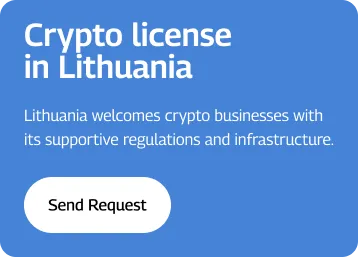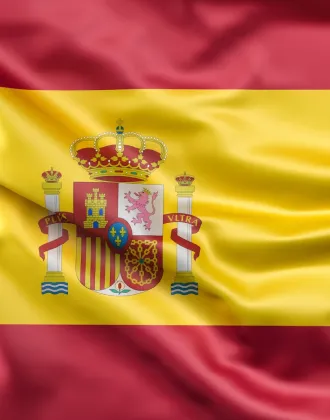
Crypto License in Lithuania
Lithuania is the most popular jurisdiction in the world for starting a cryptocurrency business. Gofaizen & Sherle provides professional assistance and support in remote obtainment of a Lithuanian crypto license with a guaranteed turnkey solution within 6–8 weeks and offers ready-made solution.
As of January 1, 2025, companies are required to comply with the Markets in Crypto-Assets Regulation (MiCA), which establishes uniform standards across all EU countries. Consequently, from the beginning of 2025, Lithuanian VASPs must secure a CASP license. However, an alternative solution is currently available, allowing entities to register as a VASP under pre-MiCA conditions until May 31, 2025.
Previously, in order to apply for a crypto license in Lithuania, you had to have a limited liability company (UAB) to provide cryptocurrency exchange or storage services. Starting November 1, 2022 entrepreneurs wished to start a crypto business in Lithuania had to pay a registered capital of EUR 125,000. Previously, the minimum share capital was 2 500 euros. In addition, a special register of Lithuanian crypto licenses with a list of crypto companies and the requirement to have an exclusive AML officer were envisaged. UAB (LLC) legal form allows conducting crypto activities of custody wallet operator, as well as cryptocurrency exchange services.
It is relevant to highlight that the Lithuanian legislation allowed registering a crypto company WITHOUT an authorized capital contribution in ANY amount at ANY time, despite the requirement of having a share capital of 125,000 EUR registered.
Thus, unlike most European jurisdictions who are crypto-friendly, Lithuania had the fastest, most economical, and clear understanding frameworks of the future, with several principles of the MiCA Directive already implemented.
The activities of the virtual asset service providers in Lithuania fell under the next types of crypto licenses:
- Cryptocurrency exchange license — allowed a company to exchange virtual currency against FIAT and vice versa, or virtual currency exchange between each other, and as a result gain commission for the services provided.
- Cryptocurrency wallet license (cryptocurrency custodial services) — allowed a company to keep on its own wallet virtual currencies on behalf of the client as well as keep encrypted private keys from the wallets.
- To a crypto exchange – provided an opportunity to carry out cryptocurrency exchange transactions.
- Cryptobroker – allowed you to broker cryptocurrency transactions.
- For crypto trading – for companies that carried out direct trading of cryptocurrencies.
- VASP license in Lithuania – was intended for virtual asset service providers than offered a wide range of services, including cryptocurrency wallets and ICOs.
Licenses are supervised by the Lithuanian Financial Crime Investigation Service (FCIS).
The list of legal entities operating as virtual currency exchange operators in Lithuania is constantly updated and available to the public at the regulator’s official website.

Overview of Crypto Regulation in Lithuania
| Project time frames | 1 to 2 months |
| State fee for application | 0€ |
| Required share capital | EUR 125 000 |
| Corporate income tax | 15% |
| Annual supervision fee | 0€ |
| Local staff member | Required (AML Officer) |
| Physical office | Not required, recomended |
| Accounting audit | Not required |
| Sustainability | Sustainable |
| Bank account options | European EMIs |
Cost Of Cryptocurrency License In Lithuania valid until 31.05.2025
Choose the best package of services for obtaining a crypto license in Lithuania
Ready-made company with obtained VASP registration
Full set up of the VASP business with all the necessary infrastructure, connection to KYC providers, local substance and Accounting services
- Full Turnkey Company Transfer
- VASP registration
- Address of registration for 1 year
- Registered share capital ( EUR 125,000)
- Individual AML/KYC Policy
- Handling the communication with the Financial Crime Investigation Service (FCIS/FNTT)
- Search for premises for rent
- Apostilled and Translated set of corporate documents
- Assistance in opening segregated Bank accounts (C2B/B2B) under guarantee key result
- Company’s name change



Ready-made company with the Lithuanian Crypto License
€25000
Price
6-8 weeks
Duration
List of capabilities for VASP registered in Lithuania
Exchange crypto to crypto
VASP Companies are authorized to offer exchange services between different types of virtual assets (utility tokens and coins). At the same time, the trade of security tokens is not allowed, since it requires an additional investment firm license
Exchange crypto to fiat and fiat to crypto
Cryptocurrency license in Lithuania allows its holder to offer the services for exchanging cryptocurrency for fiat currency and vice versa, meaning their customer can buy or sell available utility tokens for currencies such as US Dollar, Euro, British pound, etc
Storage crypto on behalf of the users
The Lithuanian VASP license allows its operator to store crypto assets on behalf of their customers through custodian crypto wallet, meaning that operator can open wallet for the customer and private keys will be held by the VASP
Informational services on the balance
Authorized VASP has the authority to manage and safeguard cryptocurrency depository wallets belonging to clients, and store and provide clients with information services on balances, and incoming and outgoing transactions
Send crypto to the 3rd party on behalf of the client
VASP may offer services to transfer cryptocurrency from the Client’s wallet to a wallet specified by the Client by their order, being an intermediary. This service is a crypto alternative to wire transfers in fiat currency
Staking
VASPs have the right to use stacking as an additional tool to generate passive income from cryptocurrencies. Many blockchains use Proof-of-Stake consensus algorithms and their counterparts. This is a profitable alternative to classic cryptocurrency holding and is analogous to bank deposits in crypto. Yields can reach 10% per annum and higher
Fiat storage and Exchange
VASP may accept fiat currency as a prepayment for services (generally, to exchange it for cryptocurrency). This prepaid amount in fiat currencies may be reflected in the Client’s account as a “balance in fiat currencies”. Even though custody of fiat funds is not allowed under the VASP license in Lithuania. Operator can store the prepayment for indefinite amount of time as a counter obligation, but it should be exchanged in the end to crypto
ICO
The Lithuanian VASP can also conduct ICOs, in which an offer to buy its cryptocurrency is made for the first time through the VASP. It is important to note that under an ICO, VASP company is only allowed to issue utility tokens
Requirements for a crypto license in Lithuania valid until 31.05.2025
After Lithuanian AML Law amendment in 2022 June 30 No. XIV-1374 new requirements for Lithuanian crypto license were introduced:
- Registered share capital shall be at least 125 000 EUR, however there’s no own funds monitoring requirements and solution without actual contribution of the funds exists
- Requirement to appoint exclusive senior employee (AML Officer), who shall be permanent tax resident of Lithuania. AML Officer shall be employed to the VASP and receive salary agreed
Licensed Lithuanian crypto company shall take into account the local market and organize some essential activities through Lithuania - Reputational requirements, like absence of valid criminal record, were also established for VASPs senior management, shareholders and beneficial owners
- Prohibition for opening anonymous accounts as well as lower limits (€700) for clients identification
Other requirements, as reporting to FCIS (including obligatory reports based on transactions’ value) and obligation to keep records with customer data, remain the same and include:
- Obligation to have in place policies aimed to prevention of money laundering and terrorist financing
- Obligation to fulfill international sanctions regimes
- Obligation to identify customers and store their data
- Obligation to implement risk-based approach in the course of licensed activity
- Obligation to report suspicious transactions and certain operations
- Other obligations arising from applicable law
There’s no obligatory requirement to have local director for Lithuanian VASP license and therefore foreign individual can ensure secure control over the VASP’s activity
Request more information about the crypto license in Lithuania
Procedure for obtaining a Crypto License in Lithuania valid until 31.05.2025
After 6-8 weeks company will be fully registered as a Virtual Asset Service Provider and 2-3 weeks will be required extra to become fully operative and open a Bank account
PRELIMINARY PROJECT ASSESSMENT
Result: All the needed documents for the process initiation are collected.
Collecting preliminary set of the documents from the Client side:
- An up-to-date copy of the passport of the country of residence (scan)
- A business model of the company (brief description 1-2 A4 pages)
- Preferred company name is provided
- Filled customer profile(s) from all the participants of the project are collected
- Address of residence for each participant is provided
- Budgets and scope of the project are approved according to the initial workshop
- Gofaizen & Sherle operational department has drafted PoA and shared it with the Client along with further steps
COMPANY TRANSFER PROCESS
Result: VASP company with registered share capital (EUR 125,000) is transferred to a client’s favor and fully compliant with the law
- Preparation and submission of the public announcement and decision of the director of the name change to the commercial registry of Lithuania
- Preparation and submission of the decision of the director change to the commercial registry of Lithuania
- The Client will be presented with a list of 30-40 questions (to identify risk appetites, the geography of the customers, the nature of the business, etc.)
- Integration of the answers into the main set of documents (adaption of customer due diligence measures, implementations of sanctions, collecting and storing data, principles of verification, etc.)
- Preparation of the Power of Attorney, confirmation for the notary deal, JAR-PSA forms, and other related documentation
- Arrangement and conduction of a notary deal
- Documents translation
- Submission of information to the Registry of Shareholders (JADIS)
- Submission of information to the Registry of Beneficiaries (JANGIS)
- Changing of the company contact data in the commercial registry
- Corporate document collection, translation, and notarization
- Search for premises for rent based on the Client preferences (size, cost, location, infrastructure)
CORPORATE ACCOUNT OPENING AND ACCOUNTING
Result: The company has an operational corporate account under crypto with connected accounting service
- Analysis of the most suitable Banks/EMIs, comparison of the risk appetite of the Bank in relation to the risk appetite of the Client based on previously prepared AML policies (Done simultaneously with premise search)
- Collection of necessary documents from the Client side to initiate the process (flow of funds, source of wealth, description of the purpose of opening an account, key partners, company website, utility bill, etc.)
- Initiation of the onboarding procedure simultaneously in 2-3 crypto friendly EMI’s
- Guiding the Client’s company through the entire process of opening an account
- Acquiring connection (if necessary)
Crypto Exchange License in Lithuania
Obtaining a license for a crypto exchange in Lithuania allows a business to legally provide a large list of services in the field of cryptocurrencies. This includes not only the exchange of digital assets but also several additional services that provide a comprehensive approach to working with cryptocurrencies:
- Cryptocurrency exchange and trading: Companies with a Lithuanian license can offer customers services for buying, selling, and exchanging cryptocurrencies both for fiat money and between different cryptocurrencies. This allows private investors and corporate clients to easily manage their digital assets.
- Safe custody of assets: High-security standards ensure that clients’ cryptocurrency assets are safely stored. Licensed exchanges use advanced technology to protect data and funds.
- ICOs and STOs: Licensed companies can organize and conduct initial coin offerings (ICOs) and securities token offerings (STOs), which provides new prospects for attracting investment.
- Integration via APIs: Providing APIs for third-party developers makes it easy to integrate exchange services with other applications and services, which expands the functionality of the platform.
Companies that have obtained a crypto exchange license in Lithuania are required to comply with regulatory requirements and provide regular reports:
- Financial Reporting: Annual and quarterly reports on the company’s financial operations, ensuring transparency and accountability.
- Management reports: Documentation of internal processes and management strategies to maintain a high level of operational control.
- AML/KYC Compliance: Businesses are required to maintain thorough documentation and regular reports on compliance with anti-money laundering (AML) and customer due diligence (KYC) policies, ensuring all transactions are legal and secure.
Lithuania Regulatory Authorities and Compliance
These primary regulatory authorities ensure that crypto businesses operate within a secure and transparent framework, providing confidence to investors and users.
| Regulatory Authority | Role |
|---|---|
| Bank of Lithuania | Supervises financial markets and ensures stability and compliance |
| Financial Crime Investigation Service | Enforces anti-money laundering (AML) and counter-terrorism financing (CTF) regulations |
Advantages of a crypto exchange license in Lithuania:
- The Lithuanian regulatory environment is known for its transparency and clarity, making it easier for companies to comply with legal requirements.
- The license provides direct access to the European Union market and to European Economic Area (EEA), opening up extensive business opportunities and attracting international clients. Regulatory Environment is favorable and clear.
- The license significantly strengthens the trust of customers and partners, which contributes to the company’s reputation in the global marketplace.
- Licensed companies can develop new products, which contributes to sustainable business growth and development.
Conclusion
Obtaining a crypto exchange license in Lithuania opens up significant opportunities for companies in the digital asset sector. Lithuania, thanks to its progressive regulation, allows companies to operate legally and safely in the cryptocurrency market, offering a wide range of services including cryptocurrency exchange and storage, ICOs, and API integration.
Adherence to strict reporting and regulatory rules ensures transparency and accountability, which builds trust with customers and partners. The license provides access to the European market, providing opportunities to grow and scale the business. While the licensing process requires careful preparation and compliance, the benefits it provides make it advantageous for companies looking to become leaders in the cryptocurrency and blockchain industry. By fulfilling all conditions, companies can successfully establish themselves in the market and significantly expand their capabilities in the digital world.
Detailed requirements for the company
To obtain a VASP license in Lithuania, companies must comply with the following requirements that ensure the security and transparency of their operations::
- KYC/AML procedures
All customers of the company must undergo mandatory identification and identity verification procedures. Regulators must have access to customer data to ensure proper supervision and prevent illegal activities.
In addition, each company must have a designated officer responsible for compliance with AML/KYCprocedures. This officer is also required to notify the Financial Crime Investigation Service (FCIS) of suspicious transactions and other risks.
- Internal controls and risk assessment
Companies are required to establish a system of internal controls and develop risk assessment procedures. This is necessary to manage operational risks and comply with regulatory requirements.
- Reputation of key individuals
Board members and owners of the company must have an impeccable business reputation and no criminal record. This is a key requirement to prevent individuals with questionable backgrounds from being involved in the management of companies. Details of all beneficial owners (UBOs) must be provided at the time of license application.
At the same time, no physical presence in Lithuania is required for foreign founders and key persons of cryptocurrency companies located abroad. This greatly simplifies the process of company management for non-residents.
List of required documents:
- Apostilled passports of all participants.
- CVs of all project participants, including information about their professional experience and skills.
- Documents confirming the reputation and qualifications of the AML officer, who must prove the absence of a criminal record and availability of relevant education and experience.
- Detailed description of KYC/AML procedures and the company’s business plan.
Taxation of crypto companies and cryptocurrency transactions in Lithuania
Taxation of crypto companies in Lithuania
- Virtual currency exchange services and wallet services are not considered as financial services and therefore are not subject to VAT
- Services provided and accounts paid in virtual currencies are subject to normal VAT rules
- The cryptocurrency company’s profits are taxed at a rate of 15%. A small company with less than ten employees and less than 300,000 euros of gross annual income may be taxed at a reduced corporate tax rate of 0-5%
- Income tax (WHT) 15% is levied on distributed profits (dividends paid)
Taxation of transactions with cryptocurrencies in Lithuania
The taxation of transactions in virtual currency depends on the nature of the transactions. There is no direct tax if the token is sold or purchased similarly to a security, investment or other currency
Payment of goods or services in virtual currency does not exempt from VAT. Sales are considered normal/regular, even if payments for goods and services are received in virtual currencies. For accounting purposes, the transaction must have a value in euros and VAT rules are applied as for transactions with fiat currencies used. If VAT is applied to payments in fiat currency, it should also be applied to payments in virtual currency. VAT declarations must be submitted in euros and VAT should be paid or returned in euros
Standard Tax Rates in Lithuania
The cost of obtaining a crypto exchange license in Lithuania is notably competitive compared to other EU countries. This reasonable cost, coupled with a streamlined licensing process, makes Lithuania an economically one of the most attractive jurisdiction for crypto businesses in EU. The expenses involved in securing a license can vary based on the type of VASP license and the scope of operations.
Despite these costs, they remain lower than in many other European jurisdictions, positioning Lithuania as a financially viable option for crypto enterprises.
In addition to a favorable regulatory and economic environment, Lithuania offers potentially lower operational costs and fast process. This combination of affordability and efficiency makes Lithuania a prime destination for both startups and established firms aiming to optimize their investment.
| Tax Type | Rate |
|---|---|
| Corporate Income Tax (CIT) | 15% (changing to 16% in 2025) |
| Tax on Branch (BT) | 15% |
| Capital Gains Tax (WCL) | 15% |
| Dividends paid out | 15% |
| Value Added Tax (VAT) | Does not apply to crypto |
| Social Insurance (SVP) | 19.5% |
| Medical Insurance (SA) | 6.98% |
FCIS (FNTT) as Lithuanian supervisory body for VASP’s
Register of licensed crypto companies is kept by Lithuania Centre of Register, however activities related to virtual assets are supervised by Financial Crime Investigation Service (FCIS, in Lithuanian: Finansinių nusikaltimų tyrimo tarnyba or FNTT) – law enforcement agency under the Ministry of the Interior, which is part of Financial Intelligence Units’ international network. FCIS activities are aimed to prevention of money laundering, terrorist financing and violation of sanctions. Lithuanian FIU is also responsible for investigations related to financial crime, including VAT-related and other tax machinations, money laundering, and illegal receipt or use of financial assistance from the EU. FCIS is actively participating in National Crime Prevention and Combating Corruption Program and constantly developing methods to engage society in the fight against financial crime. This authority regularly issues orders describing certain aspects of legislation in the AML/CTF field, which are directly applicable to the relevant obliged entities.
Supervision under crypto projects is primarily performed by FCIS through targeted inspections which are planned 1 year in advance. FCIS is publishing list of companies being supervised this way at the beginning of the year, however unplanned targeted supervision also possible in certain circumstances.
In 2023 FCIS also introduced regular reporting for VASPs, which shall be performed annually. Such approach certainly will affect market’s transparency and allows performance of more effective supervisory approach.

AML Officer
Lithuanian AML law requires from VASPs to appoint appoint AML Officer (leading employee) who would organize the implementation of money laundering and/or terrorist financing prevention measures set out in the AML law and cooperate with the FCIS. In addition, when the company is managed by a board, it must appoint a board member to organize the implementation of money laundering and/or terrorist financing prevention measures. The appointment of such employees and board members must be notified in writing to the FCIS no later than 7 working days after their appointment or replacement.
AML Officer appointed shall have the appropriate education, work experience, and skills necessary for implementation of risk-based approach inside the company. In addition, the person’s reputation has great importance here. After new law came into force, AML Officer appointed to crypto company shall be permanent tax resident of Lithuania and restriction for appointment to more than one VASP applies.
AML Officer performs the following functions in the company:
- Ensure that the AML/CFT, sanctions policies, procedures and internal control measures are adequate and proportionate, taking into account the characteristics of the company and the ML/TF, sanctions risks to which it is exposed;
- Develop and, when necessary, update the company’s internal policies related to AML/CTF and sanctions;
- Ensure that there is periodical reporting to the CEO on the activities carried out by the AML officer and that the CEO is provided with sufficiently comprehensive and timely information and data on ML/TF, Sanctions risks and AML/CFT, sanctions compliance, which is necessary to allow the CEO to carry out the role and functions entrusted to it;
- Informing the CEO of any serious or significant AML/CFT, sanctions issues and breaches and recommending actions to remedy them;
- Monitor and verify on an ongoing basis that the company is fulfilling the requirements prescribed by internal policies established and according to applicable laws and regulations;
- Provide other employees with advice and support regarding the rules related to AML/CTF and sanctions;
- Inform and train the employees about the rules relating to AML/CTF and sanctions;
- Investigate and register sufficient data on received internal notifications and decide whether the activity can be justified or whether it is suspicious;
- Filing and sending of the relevant reports (e. g. SAR, CTR);
- Develop and maintain an ML/TF risk assessment for business-wide and individual ML/TF risk assessments;
- Cooperate and communicate with FCIS;
- Inform the CEO whether the human and technical resources allocated to the AML/CFT and sanctions compliance function are insufficient and should be reinforced;
- Approval for establishing, or continuing the business relationship with a PEP, correspondent relationship and other high-risk customers;
- Perform other functions which are assigned to the AML Officer under the applicable law, internal policies, job description.
Sanctions for failing to comply with the AML/CTF regulation
There’s many supervisory authorities (e.g. Bank of Lithuania, Chambers of Notaries, Auditors, etc.), which are responsible for imposing of fines to obliged entities, but for VASPs only FCIS may perform inspections, make orders for elimination of deficiencies and impose fines.
Lithuanian AML law establishes the following measures may be implemented for the purpose of ensuring fulfillment of regulation by VASP:
- Issue of mandatory instruction;
- Issue of warning;
- Imposition of fine;
- Temporary or permanent senior managers or other employees removal and/or revocation of their powers;
- Temporary or permanent suspension of the activities and/or prohibition for provision of services;
- Revocation of license issued.
From the responsibility’s point of view Lithuanian AML law defines gross and systematic violations, which have more significant importance and more strict regulatory measures. Amount of fine may be imposed depends on the company’s annual income and may grow up to 10% of the gross annual income received in the course of licensed activity.
FAQ about Lithuania crypto license
What is the validity period of a cryptocurrency license in Lithuania?
The license to conduct cryptocurrency activities in Lithuania is issued for an indefinite period.
What advantages does Lithuania offer as a jurisdiction for engaging in cryptocurrency exchange and storage-related activities?
There are several advantages:
- A sustainable regulatory environment with MID-LONG run prospect and vector of the regulation in line with MiCa.
- Attractive tax regime and ease of doing business.
- Simplified verification requirements allowing onboard users worldwide.
- Ability to register €125,000 capital without actual deposit.
- High level of reputational attractiveness and, as a result, ease of opening Bank accounts and cooperation with third-party partners.
Types of Crypto Licenses in Lithuania and allowed activities for crypto companies
The company holding a crypto exchange license in Lithuania allows to conduct the following types of activities:
- Exchange fiat currency for cryptocurrency and vice versa.
- Exchange cryptocurrency against other kinds of virtual assets.
- Keep cryptocurrency on behalf of third parties (custodial services), including the creation and storage of private encrypted clients keys.
- Conducting cryptocurrency remittance services on behalf of the user.
- Information services on the balance.
- Initial Coin offerings with Utility Tokens (ICO).
How much capital do I need to deposit to open a cryptocurrency company in Lithuania?
Since the 1st of November 2022 the requirements for entrepreneurs aiming to start a crypto business in Lithuania were tightened. According to the new legislation, in order to obtain the license a share capital in the amount of 125 000 euros must be paid.
Which terms of obtaining a crypto exchange license in Lithuania?
- Company registration.
- Legal address for 1 year.
- Opening a bank account for a share capital contribution of €125,000.
- KYC/AML policy preparation.
- Short business description.
- Full KYC of the owner and directors.
- Obtaining a crypto license.
Which authority issues a cryptocurrency license in Lithuania?
The Firm shall submit a notification to the Financial Crime Investigation Service (FCIS. In Lt. FNTT) prior to initiating an operating activity
How long does it take to get a Lithuanian crypto license?
The total duration for registering a company and obtaining permission to operate in Lithuania is approximately 6-8 weeks. To obtain a crypto license in Lithuania, several steps must be taken.
The first step to obtaining a crypto license in Lithuania is to create or purchase a company in Lithuania. To register a company there, you must first register the company with a standard authorized capital of €2,500. After that, you open a deposit account, and one of the options for increasing the authorized capital is to deposit an additional €122,500. Then, a report is taken, and the capital is registered for €125,000 in the commercial register. This process usually takes 3-4 weeks. If you want to increase the authorized capital non-monetary, completing this process may take up to 3 weeks extra time.
Registering a company with a standard authorized capital of €2,500 takes 2-3 weeks. Then, one week is spent increasing the authorized capital to €125,000, followed by another week to register the company as a virtual asset provider. After that, the infrastructure is set up, new procedures are written, and a physical office is searched for, which takes another approximately two weeks. Therefore, in general, this process takes about 6-8 weeks.
Is it necessary to have a banking account to obtain a crypto license?
There are no specific requirements for a bank account to obtain a Lithuania crypto license. However, to acquire authorization as a virtual currency exchange or storage operator, you must register an authorized capital of €125,000. It can be done in a monetary or non-monetary way. If it’s non-monetary, you do not need a bank account. In case it’s monetary, a bank account is required, but it doesn’t need to be in Lithuania. In this case, you must deposit the total €125,000 or at least a quarter of the amount into the bank account.
How is a crypto company in Lithuania taxed?
Across the European Union, VAT (Value Added Tax) does not apply to financial transactions, including cryptocurrency transactions, which are considered financial transactions. Consequently, a 15% corporate tax will be charged. Companies with up to 10 employees and a total volume of fewer than 300,000 euros may qualify for a reduced tax rate of 5% corporate tax.
Can a foreign company obtain a crypto license in Lithuania?
Yes, a company located outside Lithuania can be registered in Lithuania. However, this process may involve certain regulatory risks associated with the country where the company is initially registered and lacks the required license.
Can the director of a crypto company be a non-resident of Lithuania?
Indeed, a company director is not required to be a resident of Lithuania, provided they possess the requisite expertise, are well-suited for the role, and maintain an unblemished reputation.
Is it possible to deposit authorized capital in cryptocurrency?
Cryptocurrency can be used to deposit funds into the company’s account and register them as authorized capital. For this, a sworn appraiser must evaluate the equivalent of €125,000 held in a cold wallet or on a cryptocurrency exchange relative to fiat currency. Following this, the transaction is verified by a notary who confirms the appraiser’s documents are accurate before submitting them to the registry. It’s worth noting that this process is faster for monetary deposits, which do not require appraisal and can be completed in a week. In contrast, the non-monetary contribution involving an appraiser takes approximately three weeks.
Are audit requirements applicable to cryptocurrency companies?
In Lithuania, there are no mandatory financial audit requirements. However, the regulatory authority may conduct periodic assessments to ensure that companies comply with the relevant regulations and industry standards.
What measures are in place to prevent money laundering and terrorism financing in Lithuania, and when are these measures applied?
Lithuania’s virtual currency deposit service providers and exchange companies must implement measures to prevent money laundering and terrorism financing. These measures include client and recipient identification, continuous monitoring of customer relationships, and verification of client and recipient identities using reliable and independent sources. Operators must also promptly notify the Financial Crime Investigation Service (FCIS) of suspicious transactions and conduct detailed examinations of complex or extensive transactions. Internal control policies and procedures must be established, and staff should be trained to ensure compliance with anti-money laundering (AML) and counter-terrorism financing (CTF) regulations.
Operators must identify and verify the client and recipient’s identity before starting a business relationship or conducting a single virtual currency exchange transaction equal to or greater than €700 or its equivalent in foreign/virtual currency. A risk-based approach uses standard, enhanced, and simplified identification procedures. If operators are unable to meet the requirements, they must refuse cooperation. When a threat of money laundering or terrorism financing is detected, operators must report the suspicious transaction to the FCIS.
Explore other Crypto Licences
Connect with our experts
Our experts will tell you how to do it as quickly and easily as possible.
By clicking the button, I confirm that I have read the privacy policy and consent to the collection and processing of my personal data in accordance with the GDPR rules.
to our news & insights




















